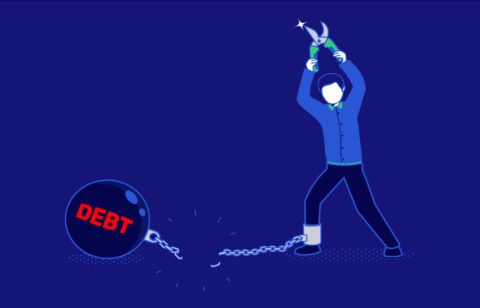College debt will never be a prerequisite to getting a college degree. All it really takes are good planning skills from parents and great financial habits from the student. While a lot of students are not financially well off to be able to get assistance from their parents, that does not mean they can let student loans ruin their lives.
You do not need to hear some really bad news about student loan debt to decide that you need to make a smart choice about it. You owe it to your future self to make a wise choice about your finances period. Regardless if you are still in school or you have rich parents, you need to learn how to manage your money so you can go out into the world and make yourself wealthy through your own efforts.
College loans will be more costly this year
Getting a higher education without college debt seem like a tough thing to do – but it is not impossible. There are a lot of students who have gone through this phase in their life without having to borrow a single cent.
But if you think that is impossible for you to do because you do not have enough time to save up for your tuition fee, that is alright. You can borrow money to pay for your college education, but make sure that you will do it correctly. More than ever, the situation now requires each and every student who will borrow money to be wise when it comes to taking out student loans.
According to an article published in Forbes.com the interest rate for school year 2014-2015 will be higher than last year. It is expected to rise by 0.8%. It may seem like a small percentage but the bigger the loan, the bigger interest amount you will be forced to pay off. The article said that the Stafford Loan that is an aid reserved for undergraduates will go up from 3.86% to 4.66%. The rate for the Direct unsubsidized loans for graduate students will rise from 5.41% to 6.21%. Direct PLUS loans for both parents and graduate students will increase from 6.41% to 7.21%.
All of these data will really make life a lot harder for students who need a loan to go through college. But even if you are trying to wrap your head around this financial difficulty, you might be comforted to know that all is not lost. With some effort, discipline and self control, you can focus on two factors that will help keep college debt from ruining your future.
Your degree determines if you can afford your student loan payments
The first factor involves the degree that you choose to study. If you need to borrow money to get a particular degree, you must ensure that it will lead you to a career that can afford to pay it off. It does not matter if you study medicine, education or political science, you need to repay student loans.
Let us lay them out for you and connect how this is important in relation to your student loans.
- Your degree will tell you the career path that you can take. The best way to choose a college degree is to determine what type of career you can work on for the next few decades of your life. Do you picture yourself being a teacher, a doctor, a lawyer or a businessman? Or do you see yourself being an inventor or a scientist? You want to look at the career you want to have before you choose the appropriate degree that will allow you to qualify for that career.
- Your career will determine how much you will earn. Thanks to the Internet, you can easily see how much professionals are earning these days. If you want to be a doctor, you can check out the average earning potential. You can narrow it down to specialty and even location.
- The expected earnings of your intended career should define if you can afford to pay off your college debt. Finally, once you know that national average, you should be able to make a smart decision as to whether you can afford the student loan payments that you are trying to apply for.
It is as simple as this: if you have chosen to be a teacher by profession, why would you put yourself through $100,000 debt when the average salary of a teacher is only $30,000 to $40,000 annually? At least, this is true when you are just starting your career. It does not make sense to pay so much when your salary is not expected to be at par with what you have to pay off.
Huffingtonpost.com revealed that 51% of Americans who have college debt through the Education Department (Direct Loans) have difficulties with their payments. A lot of those who are not making payments have said that the cause of that is financial hardship. Do not be a part of this statistic by making a wise choice about your degree in the first place. If your chosen career can only pay yourself this much income, then know the limit of student loans you can borrow. That will keep your debt from eating more than half of your monthly salary and making your life a living hell.
Your college expenses will set the pace for your financial future
The second factor that you need to look into is your college expenses. How you spend your money while you are studying will set you up for a life of debt or financial success.
According to CollegeBoard.org, the undergraduate budget for SY 2013-2014 are as follows:
- Public 2-year Commuter: $15,933 ($3,264 tuition fees; $7,466 room and board; $1,270 books and supplies; $1,708 transportation; and, $2,225 other expenses)
- Public 4-year In-State On-Campus: $22,826 ($8,893 tuition and fees; $9,498 room and board; $1,207 books and supplies; $1,123 transportation; and, $2,105 other expenses)
- Public 4-year Out-of-State On-Campus: $36,136 ($22,203 tuition and fees; $9,498 room and board; $1,207 books and supplies; $1,123 transportation; and, $2,105 other expenses)
- Private Nonprofit 4-year On-Campus: $44,750 ($30,094 tuition and fees; $10,823 room and board; $1,253 books and supplies; $990 transportation; and, $1,590 other expenses)
It may be safe to expect that these will the expenses that students of SY 2014-2015 will go through. The thing is, you do not have to borrow all the money needed to completely finance your way out of college. It is understandable if some students will find it hard to fully demolish student loan debt. But that does not mean you cannot lessen it.
Here are some tips that you can use to lower your college debt.
- Get a part time job. You can probably pay for your daily expenses through the money that you will earn. Or, you can build up your emergency fund so you do not have to be financially short when an emergency strikes.
- Budget your money. Learning how to budget is very important because it allows you to identify your finances and decide where it should go to. You can prioritize your expenses and make sure that your money is not wasted an only spent on the important purchases.
- Study hard. Another way to lower your expenses is to just study hard. You may be able to qualify for a scholarship the next year so make sure your grades are up.
If you need help with student loans, National Debt Relief offers a consultation service that will help you select the right debt relief program to make your payments easier. The company can help you find the right program based on your financial situation, employment conditions and college debt. National Debt Relief will even help with the documentation. There is a one-time service fee involved that will be deposited in an escrow account. When you are happy with the service and the paperworks, only then will the payment be released.







